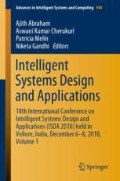Abstract
Aims of this paper is to amalgamate the logistic regression algorithm under big data with the weight of evidence. To construct a new credit scoring model to analyze the user’s credit score and then divide the user into trustworthy customers and non-trustworthy customers respectively. Calculation of credit score shows the relationship between independent and dependent variable. The weight of the evidence is calculated by the maximum correlation orthogonal transform, which can have a significant effect on models with higher correlation. Due to the error in the data collected, the logistic regression error is large. Therefore, it is suggested that by constructing a hybrid scoring model a more accurate credit score can be obtained. This helps to improve the prediction accuracy of the credit score.
Access this chapter
Tax calculation will be finalised at checkout
Purchases are for personal use only
References
The Hong Kong Institute of Bankers: Credit risk management. Wiley, Hong Kong (2012)
Gjini, V., Koprencka, L.: Relationship Between Economic Factors and Non-Performing Loans-the Case of Albania, p. 61. International Advisory Board (2018)
Akko, S.: An empirical comparison of conventional techniques, neural networks and the three stage hybrid adaptive neuro fuzzy inference system (ANFIS) model for credit scoring analysis: the case of turkish credit card data. Eur. J. Oper. Res. 222(1), 168–178 (2012)
Danenas, P., Garsva, G., Gudas, S.: Credit risk evaluation model development using support vector based classifiers. Procedia Comput. Sci. 4(4), 1699–1707 (2011)
Finlay, S.: Multiple classifier architectures and their application to credit risk assessment. Eur. J. Oper. Res. 210(2), 368–378 (2011)
Tsai, M.C., Lin, S.P., Cheng, C.C., Lin, Y.P.: The consumer loan default predicting model – an application of DEA-DA and neural network. Expert Syst. Appl. 36(9), 11682–11690 (2009)
Bennouna, G., Tkiouat, M.: Fuzzy logic approach applied to credit scoring for microfinance in Morocco. Procedia Comput. Sci. 127, 274–283 (2018)
Louzada, F., Moreira, F.F., de Oliveira, M.R.: A zero-inflated non default rate regression model for credit scoring data. Commun. Stat. Theory Methods 47(12), 3002–3021 (2018)
Sampath, S., Kalaichelvi, V.: Assessment of mortgage applications using fuzzy logic. Int. J. Soc. Behav. Educ. Econ. Bus. Ind. Eng. 8, 3487 (2014)
Djeundje, V.B., Crook, J.: Incorporating heterogeneity and macroeconomic variables into multi-state delinquency models for credit cards. Eur. J. Oper. Res. 27, 697 (2018)
Wang, D., Zhang, Z., Bai, R., Mao, Y.: A hybrid system with filter approach and multiple population genetic algorithm for feature selection in credit scoring. J. Comput. Appl. Math. 329, 307–321 (2018)
Baesens, B., Gestel, T.V., Viaene, S., Stepanova, M., Suykens, J., Vanthienen, J.: Benchmarking state-of-the-art classification algorithms for credit scoring. J. Oper. Res. Soc. 54(6), 627–635 (2003)
Mukid, M.A., Widiharih, T., Rusgiyono, A., Prahutama, A.: Credit scoring analysis using weighted k nearest neighbor, vol. 1025, p. 012114 (2018)
Bhatia, S., Sharma, P., Burman, R., Hazari, S., Hande, R.: Credit scoring using machine learning techniques. Int. J. Comput. Appl. 161(11), 1 (2017)
Stiglitz, J., Weiss, A.: Credit rationing in markets with imperfect information. Am. Econ. Rev. 71(3), 393–410 (1981)
Eisenbeis, R.A., Robert, A.: Pitfalls in the application of discriminant analysis in business, finance, and economics. J. Financ. 32(3), 875–900 (2012)
Eisenbeis, R.A.: Problems in applying discriminant analysis in credit scoring models. J. Bank. Financ. 2(3), 205–219 (1978)
Lee, T.S., Chiu, C.C., Lu, C.J., Chen, I.F.: Credit scoring using the hybrid neural discriminant technique. Expert Syst. Appl. 23(3), 245–254 (2002)
Oreski, S., Oreski, G.: Genetic algorithm-based heuristic for feature selection in credit risk assessment. Expert Syst. Appl. 41(4), 2052–2064 (2014)
Tripathi, D., Edla, D.R., Cheruku, R.: Hybrid credit scoring model using neighborhood rough set and multi-layer ensemble classification. J. Intell. Fuzzy Syst. 34(3), 1543–1549 (2018)
Grosan, C., Abraham, A.: Intelligent Systems: A Modern Approach. Intelligent Systems Reference Library. Springer, Heidelberg (2011)
Author information
Authors and Affiliations
Corresponding author
Editor information
Editors and Affiliations
Rights and permissions
Copyright information
© 2020 Springer Nature Switzerland AG
About this paper
Cite this paper
Chen, K., Zhu, K., Meng, Y., Yadav, A., Khan, A. (2020). Mixed Credit Scoring Model of Logistic Regression and Evidence Weight in the Background of Big Data. In: Abraham, A., Cherukuri, A.K., Melin, P., Gandhi, N. (eds) Intelligent Systems Design and Applications. ISDA 2018 2018. Advances in Intelligent Systems and Computing, vol 940. Springer, Cham. https://doi.org/10.1007/978-3-030-16657-1_40
Download citation
DOI: https://doi.org/10.1007/978-3-030-16657-1_40
Published:
Publisher Name: Springer, Cham
Print ISBN: 978-3-030-16656-4
Online ISBN: 978-3-030-16657-1
eBook Packages: Intelligent Technologies and RoboticsIntelligent Technologies and Robotics (R0)

